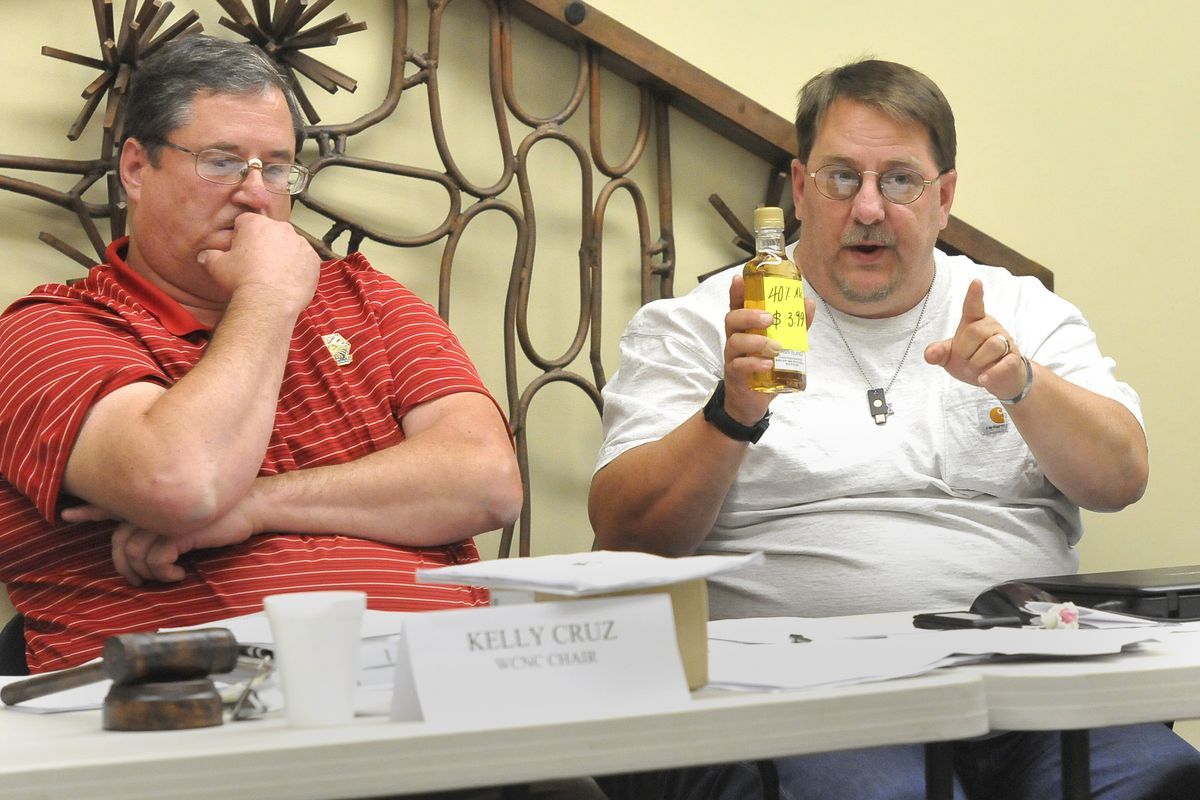Neighborhood council meeting has heated tone
West Central argues AIA
Daniel Ghebreab shows a map of the alcohol impact area that he says is unfairly harming his business. (Jesse Tinsley)Buy a print of this photo
The West Central Neighborhood Council wants its neighborhood out of the alcohol impact area.
Though the neighborhood council previously supported being part of the voluntary AIA, where sales of single-serving fortified, high-alcohol beers would be banned, at a Sept. 12 meeting members voted to send a letter asking the City Council to remove West Central from the AIA ordinance. A mandatory AIA is in effect in the East Central neighborhood. The council will hear the West Central ordinance change for the first time on Monday and vote on Oct. 1.
Getting to that point in the meeting, however, was ugly.
West Central Neighborhood Council president Kelly Cruz set a contentious tone for the night when he said he’d kick out anyone who was disruptive after one warning.
After Jonathan Mallahan, of the city’s neighborhood services office, did a short budget presentation, a flurry of motions and seconds moved the AIA discussion to the top of the agenda, accompanied by Cruz’s frequent gavel banging and shouts of “Roberts Rules.”
At one point a neighborhood council member crawled onto the floor in the middle of the room and proceeded to do a series of yogalike stretches, all while providing input to the loud discussion.
When some neighborhood council members asked why they had not received letters pertaining to the AIA debate from Cruz, he told them to check with the Postal Service.
Attempts to bring the AIA to a simple yes or no vote were repeatedly blocked by Cruz.
Former City Council member Steve Corker, who was in the audience, at one point reminded Cruz that Roberts Rules of Order are designed to help a group move forward.
“I’m suggesting you are using the rules for the opposite purpose,” Corker told Cruz, to no avail.
Neighborhood council member Cheryl Steele, who has helped local convenience store owners organize their opposition to the AIA, was clearly exasperated: “You are stonewalling us,” she yelled at Cruz, who said he was just trying to follow proper meeting procedures.
When Danny Ghebreab, owner of the Super C Store on North Ash Street, finally got a chance to address the neighborhood council his message was very clear:
“We don’t want the AIA here,” he said, to approving mumbles from the crowd.
Ghebreab explained to the neighborhood council – and the audience of about 30 – that it’s unfair to target beer sales from smaller retailers now that grocery stores are allowed to sell hard alcohol. “By volume, the alcohol is cheaper at the big grocery store than at my store,” Ghebreab said. “The state is allowing alcohol sales at the big stores, and now the city wants to stop me from selling alcohol. It’s not fair to the small store owners.”
In a letter circulated at the Sept. 10 City Council meeting, the store owners also alleged that they were excluded from last year’s neighborhood council discussions about the AIA and that they felt targeted and intimidated by the Spokane Police Department.
Special Police Problems Officer Max Hewitt, who was mentioned by name in that letter, said after the meeting that he sent letters to all alcohol license holders within the AIA, asking for voluntary compliance.
“We do that in every AIA,” said Hewitt, adding that shop owners in West Central received several letters because nobody responded. “This is part of the normal AIA procedure.”
Hewitt has also taken pictures of people drinking in public within the AIA, and has asked them where they purchased the alcohol and what type it is.
“They hold up the can and I take a picture so I can add the brand to the list of products that should be pulled,” said Hewitt. “And I ask them to leave.” As long as the AIA is voluntary, there is no enforcement clause, Hewitt said.
“I am doing that work on behalf of the neighborhood,” Hewitt said. “They are the ones who asked for the AIA to begin with. I’m just compiling the statistics.”
The West Central Neighborhood Council initially requested the AIA in December 2011.
At the meeting, neighborhood council member Judy Gilmore said that the AIA lost its impact when voters changed the state liquor law.
“Whatever was intended with the AIA has lost all effect,” Gilmore said.
After much commotion, a motion to rescind the AIA came to a vote: 21 voted for, three against and three abstained.
Once the motion passed, the neighborhood council continued debating the procedures – or lack thereof – which had guided them to this point. Steele called for and got the needed support to initiate a bylaw review.
Steele said the neighborhood never supported the AIA and accused Cruz of not accurately representing the neighborhood’s opinion in negotiations with the city and the Spokane Police Department.
Cruz maintained he has done nothing to misconstrue the neighborhood’s opinion; still, a motion passed to recall him as president.
That motion must be voted on at the next neighborhood council meeting.
“In order to get rid of me they have to have factual documentation that I did something to demean (the neighborhood council),” he said. “They have to show cause, and they don’t have that.” Cruz added that he’ll bring an attorney to the next neighborhood council meeting on Oct. 10.

